#i wrote this piece myself hal
Text
No but have yall seen the post thread about op of the walrus v fairy poll's sibling convincing them to join tumblr and how their antics were mostly contained to a discord server before
Because it only had like 5k notes when i did and it is a WILD ride
2 notes
·
View notes
Note
4,9,20 and 30 for the fic writer asks! :3
Hi, thank you! :3
4. What piece of writing are you most proud of?
I've been writing a lot this year and I'm proud of that in general, I've learned a lot... But the only thing I finished and published were the first few chapters of a fantasy longfic (Bound in Ink and Iron) as part of the 2023 DirkJake Big Bang. I wouldn't say I'm entirely happy with it but the project was and is my biggest undertaking so far, so I'd say I'm the most proud of it.
9. What's a scene you wrote this year that you're particularly proud of?
There's a scene near the end of Chapter 3 of Ink and Iron that I'm still pretty happy with. It's quiet, cold, there's lots of blood, it lays it on a little thick maybe, but it's that kind of fic, and it feels like I guess a pure expression what I originally envisioned for that scene.
There are some drafted future scenes for Ink and Iron that I am also quite proud of, one of them I wrote while actively feverish from COVID that apparently convinced my friend to stan Hal, so, guess that's a good sign.
20. If you listen to music while you write, what songs or artists did you find yourself listening to on repeat?
I tend to make myself playlists for my projects, they help me to stay motivated and sometimes provide direct inspiration for scenes and stuff. My playlist for Ink & Iron has a bunch of recurring artists on it - Mother Falcon, The Crane Wives, The Oh Hellos - mainly bc I wanted to focus on creating a specific mood. Ruined my Spotfify Wrapped I'll tell you that much.
30. What's a phrase, word, or descriptor that you're guilty of overusing?
I'm not sure... I try to keep my writing varied in terms of vocabulary and stuff, so anything like that is going to be something I haven't noticed. I'm sure I have plenty of blind spots like that. I guess I've referred to Dirk's eyes as 'amber' one too many times for my liking but there are only so many tonally appropriate ways to say 'his eyeballs are fucking orange'
#happy new year#ask meme#there are probably like. certain writing devices i rely on too often? for example describing the weather in order to set a scene#or if writing from a specific POV needing the POV character to look at / notice something in order to describe it via the narration#but those are more the products of the writing style / approach i've chosen for those fics so i don't know if they're issues per se#(I'm close to publishing the next chapter of I&I I swear)#(i started working full time and moved house and stuff and what would you know that can slow you down a tad)
4 notes
·
View notes
Note
fic writer asks:
1. What fic of yours would you recommend to someone who had never read any of your work? (In other words, what do you think is the best introduction to your fics?)
17. What highly specific AU do you want to read or write even though you might be the only person to appreciate it?
25. What other websites or resources do you use most often when you write?
I'm going to be a little cheaty- since there's two fandoms I've written a chunk for, I'd leave it up to the reader as to which they'd prefer, but they both have a lot in common.
If someone was of the Metal Gear persuasion, I'd tell them to read "Rat in a Foxhole", which is a story that consumed my brain and I think I was smashing out a chapter a day or something, because I was SO INSPIRED by a piece of artwork (itself, an album redraw) that my brain was on fire and the only way to get it out was to put the words on the screen. The fic has a bit to do with some information we get from MGS 5, specifically that Huey had intended for his son Hal to be a child mech pilot (the pilots needed to be small because of the limitations of the size of the cockpit). My brain immediately got to wondering about what would happen to such a child pilot once they grew and "aged out" of the program (or the program shut down because wtf). Then I saw @polmcarts artwork of a version of Hal and Dave meeting in some kind of bootcamp and the plot was born.
It's a sort of... meditative fic? I often imagine my stories as screenplays, and if it was viewed in that way, there would be a lot of long silences, detail shots, vast open landscapes etc. It does, of course, include a drawn out winter arc because I'm that bitch, and it's got a few twists and turns before (of course) ultimately ending on a hopeful note.
Likewise "The Man in the Mask" is a Spideypool AU that envisions an alternate meeting, and one of the characters not being forthcoming with who they are and why they're there. This one was another story that was really burning a hole in my brain, although it took me a lot longer to get it out. Having a little Marvel familiarity (with mutants and the legacy virus in particular) helps, but I've had people tell me that I did a good enough of a job explaining the concept in the fic that they weren't too lost. This one reads a bit like a "bottle episode" with the two characters more or less trapped in a single apartment and making the best of it. (I guess you could say Dave and Hal were trapped in the boot camp in the first one, so there's that.) For a story about Wade and Peter, this one also has a lot of introspection and quiet moments before a few things bubble over.
Just like the first story, this one had people screaming at me before they finished off the last chapter, which I think is a bit of a feather in my cap as a writer, it means I sold the drama and brought things to a satisfying conclusion. I call both of these some of my "weird ones" because they're extremely niche AUs that I wrote for myself, so it really makes me happy when they ping with people. I wish I had ideas like these more often.
17. I kind of have a bug in my brain about doing a fantasy adjacent Earth-65 AU featuring "The Merry Janes" and I guess AUs of AUs counts as niche... Oh, god and I really want to write a 616 or NMCU (or combo) one about Matt and Foggy being academic rivals and complaining about each other online anonymously and becoming friends (and more) without realizing. I was watching a compilation of 90's/2000's anime intros and the beginning of "His and Her Circumstances" started spooling little ideas in my head. And now that I'm on a roll, my brain is like "Lol what if Kamikaze Kaitou Jeanne AU" where Matt is a "holy thief" stealing/exorcising relics and Foggy is on the side of the law trying to bring him in sfdkdsjflj And of course there's the Madoka E-65 AU I want to flesh out at some point, but that might be a better comic than story. Moral of the story is, Anime: Not Even Once.
25. thesaurus.com LOL I don't actually do a lot of looking at resources when I'm actually writing and I don't have a lot of "go to" pages for things, it's kind of random. I will do searches for things like "what year was this thing invented", but I don't have a bookmarked tab of "popular weapons in ancient china and how to use them" or anything like that. I guess I use Youtube a lot to listen to vapor/chillwave mixes while I write, is that anything? I guess a resource I use is the sprintbot in discord (and my fellow server members) to help get my brain to focus. I keep meaning to try that website that has little doodads on it to help adhd brains focus on writing but i keep forgetting.
2 notes
·
View notes
Text
The love letter from Rhett, with Richard Burton's verbartim....
Extract from Chapter 52 of my Gone with the Wind fanfiction, The Boutique Robillard.
Monday, July 12, 1876, Atlanta
It was obvious that Scarlett had put up a wall of silence around him and double-locked any information that would be useful to her former husband in finding her.
The tied throat, he settled in Scarlett’s office, absently caressing a shawl that she had abandoned on an armchair.
He sat down in her office chair, grabbed a sheet of paper, and wrote.
"My Darling!
Or maybe I should start my letter with "Scarlett!" because your name alone embodies for eternity the most beautiful of tender words.
I shall not mention here your cruel tirade made before our separation on the train. I do not understand it and I do not accept it.
You will not marry Duncan Vayton because you cannot throw away the chance of happiness for the two of us - the four of us with our children.
I know that I am guilty of this situation. Until my last breath, I will curse my decision to divorce.
"I am forever punished by the gods for being given the fire and trying to put it out. The fire, of course, is you." (*3)
I can admit it to you without shame now:
From our eventful meeting at Twelve Oaks, "I fell in love at once. You were like a mirage of beauty of the ages, irresistible like the pull of gravity." (*3)
Scarlett, “I love you badly like a disease.” (*3) "A disease I cannot - I do not - want to cure.
Our luminous night together proved it, if any were needed: we are two infernos trying to burn each to a cinder, but whose passion will devour with eternal flames until our last breath.
Because you love me, Scarlett! I read it in your eyes! Your goddess body could not lie. It answered my own desire. You love me!
As for myself, would I dare to tire you to repeat on and on that "I love you beyond all telling"? (*3)
If I had the pure bliss of being next to you at this moment, I would kneel down in front of you.
But I must be content with this piece of paper to ask you solemnly: Will you accept to be my wife again, Mrs. Scarlett Butler? Forever!
I only aspire to one thing: the union of our hearts, minds and bodies. I want to stay faithfully by your side. To spoil you, to make you laugh, to support you, to encourage you, to admire you, to reunite our family with Ella and Wade; and to cherish you - so much cherishing you...
"Home is where Scarlett is. I want to come home." (*4)
I will wait patiently for your answer - but how can I calm a bubbling heart and arms that tremble with the desire to embrace you?
Send me a telegram or a letter. Until July 19, I will be at the Battery. Then you can reach me at the Hôtel Meurice, Rue de Rivoli in Paris. All you have to do is say "Yes”.
From now on, I will count the minutes that separate me from you from those when we will finally be reunited. For ever.
Your loving Rhett."
Author : Arlette Dambron - chapter 52 of my novel The Boutique Robillard, my Gone with the Wind fanfiction.
Follow the link to read the full chapter and novel.
#Richard Burton diaries#Richard Burton#Elizabeth Taylor#love letter#Rhett Butler#Scarlett O'hara#Gone with the Wind#fanfiction#fantic Gone with the Wind#The Boutique Robillard
2 notes
·
View notes
Text
Okay so like. I told myself that I would try finding more time to write bc the lack of the content I'm interested in in the GL tag is actually appalling to me so! I decided "I'll do lazy nanowrimo" because yay fun games (making a spreadsheet and tracking how much I write) and also like motivation.
So I was in my Google drive right and I saw the doc i use to put unrelated fic ideas and was like omg!!! Do you remember that fun tumblr au I talked about where hal lost to guy and wasn't a gl when coast city kicked it (before going full parallax mode after) I should write a quick outline for that so I dont forget it!!!!
WELL. I was writing the outline and got to the murder scene and then wrote "and then he was all like:" and then DIALOGUE came after that. Which evolved to a scene. Which sparked a super fun plot twist idea/surprise element that's just SOOOOO !!!!!!!!! and then my brain exploded. So now there are two parts to this creation aka the emerald twilight au which is very hal centric with some fun angsty parallax stuff (also guy is there. And then he isn't. Rip guy) and THEN there is part two which is whatever tf kyles intro arc is called *cues up Google machine* yeah idfk. Could of sworn it had a name though.
ANYWAYS part two would be that which originally I thought would be boring bc it would be pretty unchanged but BOY WAS I WRONG. I am not going to go into detail because I am going to force myself to keep this secret to hype myself up and give me motivation to write but let's just say do NOT underestimate the butterfly effect. 😼😼😼
Also like I realized writing the one scene I was like wait.... this is an emerald twilight au.... I'm trying to write a bunch in November..... if I finish this then I could actually post something for Emerald Twilight Weekend....... (ideal scenario)
Like im not counting my chickens there bc I have literally NEVER finished a single event piece I ever started (even when I had deadlines. Oops!) But like.... mayhaps..... 😏
Idk idk. But yeah <33333 we vibin much inspiration thay was my night
#hopefully i actually work on this one 😭😭😭😭😭😭#i have too many wips istg#and i just started another one before i started this one#but that guy has a major plot hole so im stuck there trying to logic that so might as well write this#and ignore everything else i have in progress. including the fic that ive been sporadically working on since august that is 90% done 🥴👍#but yeah. mwah. <3#blah#swishy aus#swishy writing
1 note
·
View note
Text
“Answer, That You Are Here...” Chapter 3 Preview
https://archiveofourown.org/works/20574026/chapters/88426840#workskin
“Alright. So where we stand is you’re Kid Flash, whatever that means. I asked around today and nobody had heard of a Kid Flash superhero. But guess what happened? No one knew, and on top of that everyone had this weird reaction when I asked. Exactly like what happened last night when I searched it. I still can’t think about it without getting a bit of a headache.” She rambled off, pulling her notepad out and jotting things down as she spoke. “So today, we’ll try to get past that and do some actual internet digging. Did you remember anything?” She asked, looking up to find Spector frowning at her. “What?”
He shook his head. “I know I said I needed your help but I’m starting to wonder if this is the right thing to do. You’re just 16, you shouldn’t be getting headaches doing this for me.” He sat forward, his elbows on his knees as he frowned at the floor.
Hal didn’t know what to say. “A bit. A bit of a headache. Besides,” she sighed as she paused, frustration seeping from her, “Like you said, I need your help as much as you need mine.” She reminded him.
He looked up at her and sat up, smiling after a moment. “Sure. You’re the ghost girl.” He teased, thought the trouble still lingered on his face.
“What is it?” She pressed, leaning forward. “Something’s still bothering you.”
Spector nodded. “I remembered something last night. When we found that woman’s body… she reminded me of someone I knew. Something came back to me, something about the Speed Force.” He told her, his face completely serious, his tone even and unwavering.
It struck Hal as significant, even though she hadn’t known him for very long at all. Less than a day and… he was important to her. She swallowed thickly, wondering if there was a reason he was starting to worry about her involvement. Superheroes were vigilantes, and their lives were dangerous. Was she cut out for this? No matter how much she wanted to help, would he be better off with someone else?
“Speed Force. Okay. What about it?” Hal wrote the two words in her notebook. The words looked strange, so she put a question mark beside them.
“It has to do with speedsters.” He told her, and she nodded. She found that term while researching the Flash in relation to him last night. “Our powers, more specifically. And when you get pulled into the speed force, strange things can happen. Things like-“
“Like everyone forgetting about you?” Hal interrupted, her jaw dropping as she put the pieces together.
“Yeah.” Spector flicked his eyebrows up in acknowledgment. He looked down at his translucent hands. “And me forgetting about myself.”
Hal swallowed thickly, shutting her mouth. “How do you get pulled into the speed force?”
Spector shrugged. “There are loads of different ways, actually. I’m pretty sure I ran too fast, and the speed force sort of consumed me because of it.” He explained, the lines in his ghostly face draw together.
Wait. Ghost. Was that even the right term? Was he…
“Spector, does that mean you’re alive?” Hal asked, sitting forward on the bed. “Like, we can get you out of the speed force and you’d be alive.”
#Batfamily OC#batfamily fanfiction#BatFam#batfamily#young justice fanfiction#young justice#teen titans oc#teen titans fanfiction#wally west
1 note
·
View note
Text
tanaka is the love of my life he is literally such a cool person and i love his sense of humour and positivity and courage and determination and how he's such a good person to be around and would do everything in his power to make you feel loved and he is swag.
#i wrote this piece myself hal#elk's trash#if you want to learn how to write good sentences like me#you can't#because I'm self taught#eleknosuke#he#tanaka#tanaka ryuunosuke#RYUU
15 notes
·
View notes
Text
My blogs masterpost
1 @da-roadie
The main, the myth, the legend.
2
3 @mggidk
m e m e s
4
5 @my-writer-jus-hates-the-clock
This one
6 @questions-i-wanna-ask
7, 8
9 @youreditorbarelylovestimemachine
Idk why it not come up but it was a write your url in reverse thing
10
11 @andthisoneisforwhump
My whump blog that is solely whump. Not just occasional whump. Whump.
12
13
14 @theaskgamearchives
15 @legendarypostarchive
16, 17, 18
19 @my-sanders-sides-headcanon
20
I ran out of energy to finish this
2 notes
·
View notes
Text
Mom, Tumblr ads are showing me propaganda again

/j
2 notes
·
View notes
Text
Reminder to check your bio for things you dont agree with anymore
No judgement we support growth here :)
2 notes
·
View notes
Text
A random thing I wrote that has no ending
Bruce hid a sigh as he listened to the third speaker of the night tell another terrible joke. He laughed with everyone else, too tired to do more. Ordinarily, he would lean into the opportunity to act the part of Brucie Wayne.
But he really wasn’t in the mood tonight.
The last mission with the Justice League had run overtime and Bruce was running on two hours of sleep. Ordinarily, lack of sleep wouldn’t slow Bruce down any, but for some reason he just wasn’t in the mood tonight.
Briefly, he wondered why he hadn’t allowed Alfred to make his excuses.
The presenter came back onto the stage, not so subtly wrestling the microphone away from the rambling, somewhat drunk speaker from Luthor’s company.
Bruce tuned out the speech about Wayne Enterprises’ contributions to the development of new jet propulsion technology. He had had very little to do with the development, only funded it, so most of the technical talk was going straight over his head.
“You look like you’re having fun.”
Bruce glanced to his right and saw that Hal Jordan had sat himself down in the chair behind Bruce. “Go away. We’re not supposed to know each other. People will talk.”
“Please, they’re too busy making eyes at the pretty boy you got up there singing Wayne Enterprises praises,” Hal scoffed. He was dressed in a well fitted tuxedo, though he had swapped the black jacket out for a forest green jacket decorated with elaborate rose designs.
There was a thump against the back of Bruce’s chair, and he looked down in confusion and saw that Hal had tipped his chair back on two legs, the back of it now resting against the back of Bruce’s. “Really? Are you five?”
Hal grinned at him lazily and leaned his head on Bruce’s shoulder. “No, but we’re both bored so I thought I’d entertain myself.”
“You were invited because of Ferris Air’s work with Wayne Enterprises, not to entertain yourself,” Bruce said, putting on a smile when he saw a few people looking over at him. It wouldn’t be out of the ordinary for Brucie Wayne to be distracted by a pretty face at an event, but Bruce didn’t have the energy or patience to put on the act tonight. “Go back to your table and Ms. Ferris.”
“See normally, I’d just put up with the crappy puns and eat all the food, but the food sucks. So now I’m not just bored, but also hungry,” Hal said, ignoring Bruce, head still resting on Bruce’s shoulder. “Is that your doing? Because if you paid them for this catering… you should get your money back.”
Bruce sighed again. “Hal…” he warned.
“Watery champagne and tiny canapes, Bruce!” Hal said teasingly, tilting his head to look at Bruce. There was a mischievous glint to his eyes.
Bruce looked at him, putting on another smile. Most people were still listening to the presenter talk about the new jet propulsions, but there were bound to be a few people watching them. “Go. Back. To. Your seat.”
Hal blinked at him a few times. “I really don’t want to. There’s an old couple there that keeps asking me if I want to ‘join them afterwards for drinks’,” he said with a grimace. “Somehow I don’t think they want drinks.”
Bruce was tired. And sore. And the last thing he wanted right now was to listen to Hal Jordan’s whining.
“And I’m getting the vibe that the rich-guys-masturbating-over-their-own-money scene isn’t exactly your speed either,” Hal continued blithely, still ignoring Bruce’s irritation. “What do you say we go and find somewhere that’s serving actual food?”
“I have responsibilities,” Bruce said immediately, clapping politely when the presenter introduced General Thomasson as the next speaker.
Hal tipped his head back further to look at the stage. “Oh shit, the big wigs are here,” he said dryly. “What do you say, Spooks? Wanna go find a burger joint?”
“No, now go back to your seat.”
Hal sighed dramatically. “You’re boring,” he said, letting his chair fall back onto all its feet with a muffled thump. He rose, the dim light playing over his face in a way that made his eyes look more amber than brown. “Guess it’s back to eating stale canapes.”
Bruce sighed as Hal walked away, ambling back to his table. In his ridiculous suit jacket, Hal looked very much the epitome of flashy West Coast flyboy and Bruce wasn’t the only one watching him.
Bruce shook thoughts of Hal Jordan away, focusing on the stage again.
------------
Bruce ran through the notes he needed to hit in his speech. It was a fairly standard speech, talk about the minds behind the advances, explain the advancements as the video played, make a few jokes, and then close out by thanking everyone for coming.
For all of Bruce’s practice at playing the gregarious, fun loving Brucie Wayne, he actually didn’t enjoy it very much. It was exhausting, wearing the mask all the time and he was tired.
And hungry.
Hal had been right about the stale canapes.
“You did some really good work, Wayne,” General Thomasson said gruffly, clapping Bruce on the shoulder. “These planes will give us the edge over our enemies.”
“Anything for our troops,” Bruce said, mustering up a smile. “Can’t have them going without the best.”
The General chuckled. “And it’s only going to set the taxpayer back a couple billion, right?”
“Got to keep those stocks high,” Bruce countered jokingly. In reality, he and Lucius were already planning to wean Wayne Enterprises off the military contracts that sustained the R&D department and supplement it with investment into green energies and space exploration.
But the General didn’t need to know that just yet.
“Well, I need to go and prepare for this speech of mine,” Bruce said, even though he really didn’t. “Lots of technical speak tonight and I have to make sure I pronounce everything right.”
The General gave him a patronizing smile and wave. “Off you go, Wayne. We’ll talk business some other night.”
Bruce ducked behind a set of piled speakers and sound equipment. He pulled out his phone, to give himself a convenient cover of taking a phone call.
He took a moment to compose himself. All the small talk had taken a toll on his patience and his eyes stung with exhaustion. He knew he needed sleep and a good meal, considering how fuzzy and slow he was feeling. And the thought of going up onto that stage and enduring hours more so small talk and smiles-
“You make a big sale with the military brass?”
Bruce didn’t jump but he was surprised that he hadn’t noticed Hal’s appearance behind him. “What are you doing back here?” he asked.
Hal was holding a tray of canapes and his bowtie was untied and hanging around his neck. “Hiding from the creepy couple,” he said, offering the tray to Bruce. “You want one?”
“No. Go back to your seat,” Bruce said in exasperation. “How did you even get back here in the first place?”
Hal crunched on another canape and pulled a face. “My good looks and charm. Sure you don’t want a stale canape? It tastes like cardboard.”
“I don’t want a canape.”
Hal shrugged lazily. “So why are we hiding behind a bunch of sound equipment?” he asked through a mouthful of canape, looking at one of the speakers curiously.
“I’m not hiding, and you’re not supposed to be here.”
“I’m not supposed to be a lot of things,” Hal countered immediately. “And you’re totally hiding.”
“I am not hiding,” Bruce snapped, irritated by Hal’s very presence. He had hoped that tonight, Hal would just spend his time as far away from Bruce as possible, especially since they had had a blow out the mission before. “Go away.”
Instead of listening, Hal just arched an eyebrow at him, munching on his cardboard canapes. “You don’t want to go on that stage, huh?” he guessed.
Bruce waited for an insult or a joke at his expense.
But Hal just looked around the speakers, in the direction of the stage. “Well, I can’t say I blame you. We’ve had like ten different speakers and I remember nothing of what was said or who said it.”
“Maybe you should pay more attention, then,” Bruce replied. “And I enjoy honoring the men and women who worked hard on this latest breakthrough.”
“None of them are even here,” Hal pointed out blandly, shoving the canape tray behind one of the pieces of sound equipment. “You probably already gave them a billion dollars anyway.”
“If I gave everyone a billion dollars, I wouldn’t be a billionaire for very long,” Bruce couldn’t help but say in exasperation. He really wondered if Hal ever thought before he spoke or if he just made it up as he talked.
Hal swiped a tongue over his teeth, giving Bruce a funny look.
On stage, Bruce could hear the presenters winding up to his introduction. He steeled himself with a sigh, pulling Brucie Wayne back over himself.
Hal tilted his head and then smiled, cocky and self-assured. “I wasn’t kidding about that burger, by the way,” he said.
“What?” Bruce asked.
Hal held out a hand, palm up. “You wanna blow this popsicle shop, Spooks?” he asked, eyes glinting mischievously.
“Popsicle stand,” Bruce corrected, irritated.
“Whatever, Bruce Wayne,” Hal said, rolling his eyes.
There was a beat and Bruce could hear the presenters bantering with each other. It was nearly time for them to introduce him.
Bruce had responsibilities.
He had to give this speech and thank the team for their hard work. It was their accomplishment and the least Bruce could do was show up to thank them publicly.
He couldn’t just leave and galivant around like Hal seemed to think he could.
Hal arched an eyebrow at Bruce questioningly, hand still out. His eyes were alight with amusement, the same cocky self-assuredness that got on Bruce’s nerves.
Only now it seemed less annoying.
“Offer’s expiring,” Hal sang, eyes darting to the stage and back.
Bruce took his hand.
109 notes
·
View notes
Text
Here Lies Jenny: Bebe Neuwirth’s under-remembered masterpiece?
While Bebe Neuwirth is often remembered foremost for her presence in worlds like Chicago, Cheers or Fosse, there’s another piece in the tapestry of her work that brings many notable threads together and is equally significant to her.
Here Lies Jenny is the somewhat under-discussed piece of theatre that in fact has connections to all three of these aforementioned things, because of the people she worked herself on creating it with, and deserves to be brought up with slightly more comparable frequency.
A moment then to explore some of the history of this elusive but important show.
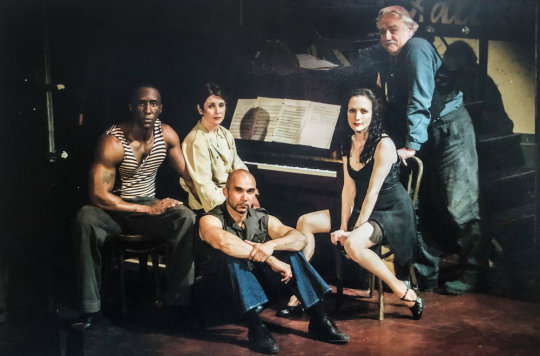
Here Lies Jenny, recalled as a “surprise off Broadway hit”, opened at the Zipper Theatre in downtown Manhattan in May 2004 and ran there for five months.
The show was an interpretive revue of the music of German composer, Kurt Weill, born out of an idea Bebe had herself. It was shaped by collaboration with close friends – with its initial genesis assisted by Leslie Stifelman (the show’s pianist, who she’d worked with on Chicago), direction by Roger Rees (who she’d long known and worked with since their time on Cheers together), and choreography by Ann Reinking (who was Bebe’s closest dance companion in the Fosse universe).
Set in a dark and shadowy looking barroom, the piece followed Bebe as the central, amorphous female figure named ‘Jenny’, supported by three male cast members and a pianist, through an evening of carefully selected Weill songs. Alongside Bebe and Leslie on stage were Gregory Butler and Shawn Emamjomeh, as two rough denizens of the bar, and Ed Dixon as the general proprietor.
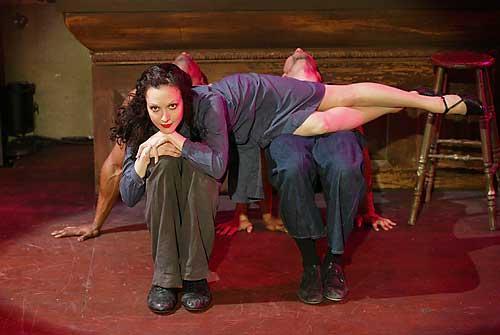
There was no linear storyline to the show and no spoken dialogue, but Bebe described how the evening unfolded “in a very logical and emotional, fulfilling way.” All of the songs presented “[described] the interaction between these five people there, that make it necessary to sing the next song.” Rather than taking a group of songs by a particular composer and imposing a narrative on them, the songs were interwoven together to create an “impressionistic and realistic painting of this person’s life.”
To give a summary of the show’s arc, Jenny initially descends the wire staircase into the bar, with little more than a frightened expression and a small bag of wordly possessions. Accosted by the two forceful patrons, she’s flattened down both physically and emotionally. The men depart and return throughout, and the emotional core of the piece fluctuates from song to song as each number evokes a different picture and interpretation of a circumstance or feeling. As reviewers put it, “she’s sometimes bold, sometimes reticent, until she leaves…with what seems like a modicum of self-possession and hope,” and “climbs that long staircase on her way into the world again.”

The idea for creating Here Lies Jenny came out of Bebe’s own desire to put together a piece of theatre and an evening of performance of her own. It was a notion intensified by growing external interest, or as she recalled, “people have always said to me ‘Do a show, do a show, do a one woman show!’”
But for a while the form the piece would take was unclear. Bebe knew she “didn’t want to do a revue”, and she didn’t want “the usual cabaret thing… [or] ‘Bebe and Her Boys.’”
“I generally hate one women shows,” she would remark, “unless it’s Elaine Stritch or Chita Rivera or, you know, Patti LuPone.”
According to Bebe, she’s “much more comfortable as a character doing something. I'm not comfortable just being myself and singing in front of people.”
On and off for around two and a half years then, Bebe had been considering how to approach this matter while putting together some music, predominantly that of Kurt Weill, with musician, conductor and friend from Chicago, Leslie Stifelman.
Leslie suggested bringing in a director, so Bebe turned to Roger Rees – a person she regards as “not just a great actor,” but also “a fantastic director”, with a “very interesting creative mind.” Showing Roger the songs, he “realised that they all described women, or aspects of women, or different times in women’s lives.”
Roger thought it would be interesting then to combine all of these varied sentiments and have them channelled through one specific woman, in one specific location, to present a complex but diversely applicable tapestry centred around the emotional interiority of one tangible female force.
The show is “fragmented, prismatic…less narrative than poetic,” according to Roger. It’s not prescriptive. Rather, it evokes strong feelings and allows the audience to interpret them into their own individual and personal narrative for this woman. It poses questions and provokes thoughts. Who is this woman? Why is she here? Why is she here now? Is that a child? Or is that just a wish for a child? What did she have in this life before we meet her and what has she now lost?
It is indeed an unusual entity, and atypical from other more standard revues, cabaret acts, or works of theatre. A “self-described Japanophile”, Bebe explained how it played in the “Japanese aesthetic concept known as wabi sabi.” Of this she would elaborate, “There’s no direct translation, but it’s about the beauty of things as they age, embracing what’s painful in life as well as what’s joyful.”
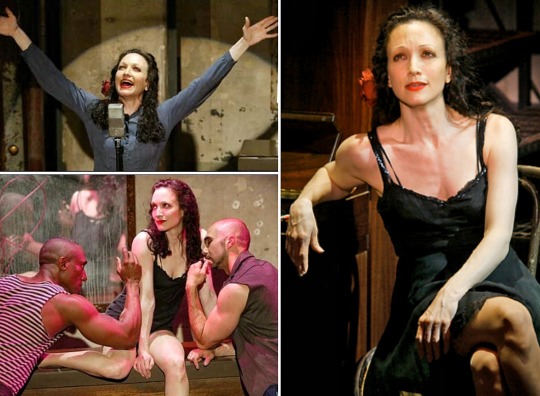
It is certainly a piece that contains beauty as well as pain, which itself is a complexity and dichotomy often ascribed to Kurt Weill’s music.
When initially finding and working on songs for what was to become Here Lies Jenny, Bebe noticed being drawn to the work of one composer most strongly.
Like Bernadette Peters talking about how she gravitates to selecting Stephen Sondheim’s material for her concerts, Bebe would say simply, “all of the music that I loved the most was Kurt Weill music.”
A revue in 1991 called Cabaret Verboten (also with Roger Rees), that sought to recreate a Weimar Republic cabaret and re-conjure some of the decadence of pre-Nazi Germany, increased Bebe’s exposure to Kurt Weill’s music and was where she “first became captivated by the composer”. Building on this strong connection and deep appreciation in the years since then, Bebe would assert of his music, “it resonates for me.”
“Neuwirth knows Weill’s music isn’t for everyone,” one reviewer wrote, “but she won’t apologize for it.” She sees its capacity to be “appreciated on many different levels,” and has described it on varying occasions as “unflinchingly honest”, “very fulfilling to perform”, not just “arch and angular and Germanic…[as] many people think”, but as having “great lyricism and tenderness”.
Bebe feels a strong affinity for Weill’s music in part because of its “ability to convey the truth completely and fearlessly and without artifice”. For example, “If you're talking about heartbreak, [his music] goes to the absolute nth degree of what that really means. The way he shows that is with fearless lyrics and the bravery to make the music as beautiful as it can be.”
“Maybe the way I appreciate it speaks to the kind of person I am,” she would say. “I’m very bright but not an intellectual. I like things in a visceral, passionate and spiritual way.” And to Bebe, Weill’s music certainly provides that – which was why devising this show was of such importance and significance to her.
Bebe said also that “the show offers the broad range of Weill's songwriting talents.” This is indeed a truism, with the work of no fewer than ten different lyrists being showcased across the nearly two dozen songs during the evening, including Berthold Brecht, Ira Gershwin, Alan Jay Lerner, Langston Hughes, and Ogden Nash.
The different styles and languages of Kurt Weill’s music mirror Weill’s own history and geographic progression through the world. Born in Germany, “Weill, a Jew, had to flee the Nazis at the height of his popularity. He fled to France and then to the United States, where he became a citizen in 1943.”
His songs reflect the world in which he was living. For instance, ‘The Bilbao Song’ is a tale of sometimes gleeful, sometimes regretful nostalgia and comes from a collaboration with Berthold Brecht in German. It is performed here only in English through the use of “Michael Feingold's now-accepted translation”. The Brechtian-ism is a feature of this production as a whole that was remarked on at the time, being appraised there was “more than a dash of an alienation effect at play,” with material being sung for example behind grilled windows or facing away from the audience.
His French material is alternately reflective of the musical identity Weill tried to devise while having to reinvent himself from scratch in France. Bebe performs one of these French numbers here, entitled ‘Je ne t'aime pas’, which has its own poetic lyricism, and indeed mournful significance, given the translation of the title as ‘I don’t love you’.
Alternately, jazzy, Broadway glamour is comparatively evident in some songs like ‘The Saga of Jenny’ from musicals that arose in America on the Great White Way out of the era of Golden Age of the American musical in the ‘40s to the 60’s.
This show was ambitious then, in its mission of exploring a wide range of the composer’s musical contributions across multiple decades, countries, styles of music, and lyrical collaborations.

Beyond his own musicals, Kurt Weill’s music has been notably seen elsewhere on Broadway or in the theatre world via interpretations such as songs in concerts with Betty Buckley, Patti LuPone, Ute Lemper; or full stage productions with Donna Murphy as Lotte Lenya in Hal Prince’s 2007 Lovemusik; or Lenya’s recordings herself.
Much of Kurt Weill’s legacy lives on through his wife, Lotte Lenya, who was seen as his “chief interpreter… [and] largely responsible for reviving interest in the composer” after his death.
Like Lotte with her “whisky baritone”, Bebe is able to convey meaningful interpretations of Weill’s music through her vocal richness and skilled acting choices, carefully controlling factors like timing, pronunciation and syllabic stress.
An example. Bebe does the most satisfying version of ‘The Bilbao Song’ I have heard. There’s a line in this song that states: “Four guys from ‘frisco came with sacks of gold dust,” in which the last portion of the phrase is repeated a further two times. Bebe emphasises the third “SACKS, of gold dust?!” in the dramatic manner stylised through my punctuation in attempts at recreating its phonology, which contrasts against the two previous readings. This gives the line a salient narrative purpose. It conveys not just an observation, but a tale of surprise and incredulity – who on earth would walk into a bar carrying entire sacks of gold dust?
It may be seemingly just one small detail, but it has a large impact. Other versions that intonate all three repetitions of this line the same miss this engaging variation and feel flat in comparison.
This song would justly so later become a staple of her concert material – along with others like ‘Surabaya Johnny’ and ‘Susan’s Dream’.
But there is unfamiliar territory traversed in Here Lies Jenny too. The rendition of Ogden Nash’s lyrics with ‘I'm a Stranger Here Myself’ is ‘new’ – and it’s exquisite, in its melodic, lilting and playful but darkly seductive swirling sentiment.
Another notable number in need of individual mention would be ‘The Saga of Jenny’. There are two Kurt Weill songs most strongly associated with the ‘Jenny’ moniker – this, and the also well-known ‘Pirate Jenny’ from The Threepenny Opera, which Bebe had done a production of in 1999. The latter was trialled in early versions of the show but ultimately didn’t “serve the piece as well as other…moments could,” so was taken out. Fortunately, Bebe would later work it into her concerts.
The former made it in, and provides the exciting opportunity to get to hear Bebe’s take on this song as made well-known by a number of respected performers. ‘The Saga of Jenny’ appeared initially in Weill & Gershwin’s collaboration for the musical Lady in the Dark in 1941, starring Gertrude Lawrence. The song has since gone through innumerable reiterations, such as via Ginger Rogers in the 1944 film adaptation of the same name; Julie Andrews’ big-production performance in the Gertrude Lawrence biopic Star! in 1968; and other high-profile concert performances like via Ruthie Henshall, Christine Ebersole, Lynn Redgrave and Ute Lemper; along with Lotte Lenya’s own recordings.
Further extending the song’s life was ‘The Saga of Lenny’ – a version devised with new lyrics by Stephen Sondheim, performed by Lauren Bacall for Leonard Bernstein’s 70th Birthday in 1988. All of these are on YouTube and I would testify are worth a watch.
In this show, Bebe performs the number with the bravado of a war-time songbird. She strides around with an old-school 1940s microphone back and forth across the stage as she progresses through the song’s distinct chronological sections, grounding the show centrally back to its identifying moniker and characterising an eponymous, engaging and multiply varied ‘Jenny’.
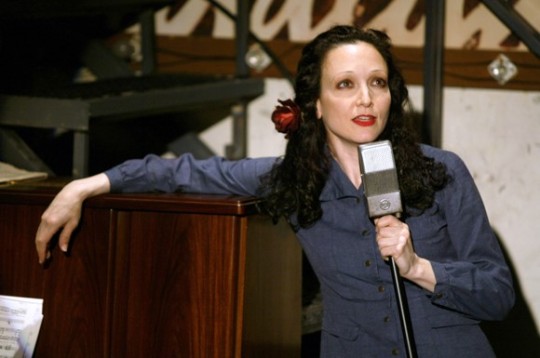
When not bound to microphones, Here Lies Jenny also involved the use of Ann Reinking’s “minimal but inventive” choreography to create striking visual images. Though perhaps not resembling the fast-paced, razzle-dazzle of Chicago, these patterns of movement are at times no less impactful. Bebe is dragged fluidly across a countertop, rolled sinuously down pairs of legs, centred in a dark tango (that one review likened as a potential metaphor for a ménage à trois), or spun backwards upside down onto Emamjomeh’s shoulder in the air – to name a few notable moments.
Not a dance show by any strict sense, all of these demands are nonetheless physically taxing. This is a matter of importance given the timing of the show.
What Bebe had long deemed a “peculiar” hip from her early twenties, begun causing notable pain when it “went from peculiar to downright bad in 2001” during Fosse on Broadway. It was recorded the “pain continued during [this] high-concept Kurt Weill revue” in 2004, such that performing this manner of movement in the show can have been no trivial feat. The next three years brought subsequent arthroscopic surgery for cartilage removal, and then total hip replacement.
That being considered, the show was able to run in the highly demanding manner it did for five months straight because of Ann Reinking’s assiduously crafted choreography.
The Zipper Theatre was the “funky downtown Manhattan space” that housed the show for that time. The timing of the production and the nature of the theatre played integral parts in the piece’s characterisation.
Roger took Bebe to see the theatre when they were devising the show, and to Bebe, it felt right. “There is this creative gesture that we are making and the gesture is completed if it’s in this place.” Not in some new, shiny theatre; but here, with a darkness and sense of history that created an evocative mood similar to the tone of the whole show “as soon as you walked into the building.” This was aided by the show beginning at 11pm each night – “absolutely an artistic choice” – given that what “happens between these five people, happens very late at night”, in a shadowy time of day filled by darkness and secrets.

Here Lies Jenny ended its run in New York in October 2004. But this did not mark the end of the piece. Bebe and her troupe took the show to San Francisco in the Spring the following year – after a seven month interim that included filming thirteen episodes of Law and Order: Trial by Jury, the aforementioned hip cartilage removal, and subsequent recovery.
The show was not deemed flawless by everyone who reviewed it. Some thought it too dark or wished for less abstraction and ambiguity. But as one article would conclude, “Faults aside, it’s hard not to recommend a show devoted to Kurt Weill,” ultimately providing a “unique and polished evening at the theatre.”
Roger Rees would reflect on the show, “Weill & Neuwirth work so well together” because Bebe’s “high standard of performance” means she is able to “delve deeply and go on forever” into material he likened to being as complex as Shakespeare.
It “demands a great deal from a performer, and she is equal to it,” Roger said. “She’s very deep in herself. There’s nothing made up about [her], which is a rare and beautiful thing. The match between performer and material is exquisite.”
This would likely mean a lot to Bebe, as the show itself meant a lot to Bebe. And still does several years later. She would cite it in 2012 as the “role she wish[ed] more people had seen”, as to her, it “was a beautiful, unusual piece of theatre”. Altogether, it was something ineffable and “bigger than the sum of its parts”.
“It’s something I've wanted to do, and I did instigate it,” she said, of putting the show together. But that’s not to say it was easy to helm matters. “For me to be in charge, makes me very uncomfortable.”
That the show got made at all then Bebe would recognise as “a testament to how deeply I love the material and how inspired it makes me.” Her trust in people like Leslie, Annie and Roger enabled the creation of such a project from the ground up that wouldn’t have otherwise existed. Thus, to borrow a phrase from Stephen Sondheim, it was the combination of both personal drive, and also the shared collaboration of four people who all “love each other very much” that ultimately ‘made a hat where there never was a hat.’
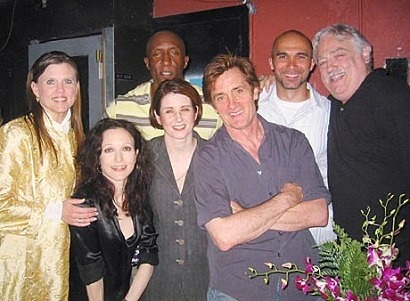
It was even further an important show to her, because it was “a very private thing.” She’d describe Jenny as a very physical and emotional role – “the most personal of anything I've done.”
It clearly holds a special place in Bebe’s own heart. Undoubtedly, it would be poignant to revisit again. As we look to the near future of theatre with shows that could feasibly be staged as events start coming back, in tandem with the publicly expressed desire of people wanting to see Bebe back on stage again, this pre-existing, modestly-sized, inventive piece would be no bad suggestion.
How about a Here Lies Jenny reprise when theatre returns?
#bebe neuwirth#here lies jenny#broadway#off broadway#theatre#theater#new york#kurt weill#composer#ann reinking#roger rees#leslie stifelman#chicago the musical#fosse#bob fosse#musical theatre#musical theatre history#theatre history#cabaret#revue#germany#lotte lenya#betty buckley#donna murphy#julie andrews#patti lupone#berlin#stephen sondheim#bernadette peters#bertold brecht
42 notes
·
View notes
Text
What happened to Dirk in Homestuck^2?
Why am I doing this to myself.
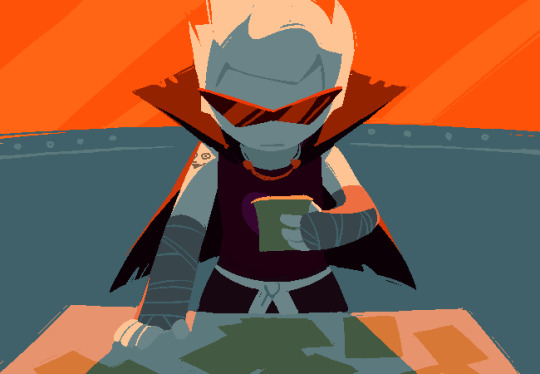
I memed a little yesterday when I was posting that article around social medias about Homestuck jokes, because once again we are in lockdown and I am therefore Stuck at Home. Canned laughter goes here. But there’s a topic related to the comic- or more specifically, its aborted sequel, Homestuck^2, that I’m interested in delving into a little bit. I’m going to avoid talking about spoilers as much as possible, but considering said comic takes place not only after the events of the massive sprawl that is Homestuck but also the more linear but still messy Epilogues, some amount of sus shit is inevitable.
Anyway. Much maligned is what the Epilogues and 2 did to everyone’s favourite decapitation target, Dirk Strider, and I have a theory as to why it happened this way.
To begin with, let’s summarise what and who Dirk is through the course of the comics. Fair warning from me, though, it’s been a while since I read through this.

Dirk Strider is a teenager who grew up in a post-apocalyptic future Earth, completely devoid of physical contact with other people and only really ever gets to talk to 3 other people, only one of whom is in anything remotely resembling a relatable situation. He struggles with self-identity, having created numerous robots including an artificial intelligence based on his own brain, aka Lil’ Hal. He’s somewhat of a control freak, and a bit of a cold aloof asshole, but means well, and is pretty gay. NBD. The kinda guy to set up a plan meticulously and thoroughly, not informing any of the moving parts even if said parts are his friends, and often involving some form of self-sacrifice.
Throughout the comic he further reckons with self-identity problems and his own self-loathing including entering a relationship with Jake which doesn’t go well and he eventually breaks off since he knows his overbearing and manipulative behaviour is Not Cool and Pretty Toxic but doesn’t know how to shut it off. Eventually he reaches the God Tier as a Prince of Heart, gaining the power to literally annihilate souls, which he never actually uses since he gets yeeted into deep (Paradox) space and then everything goes to shit. Except none of that happens because of the Retcon (aside from the God Tier bit) and we don’t actually see how that shit progressed in the canon timeline. I think. Dirk’s arc, as it were, doesn’t really come full circle- while he does assist in Dave’s character…growth? he really isn’t the focus of that conversation. This immediately precedes the action climax and there isn’t literally any dialogue after that so that’s what we’re left with.

I like Dirk in Homestuck a lot. It’s hard not to, considering the flashes heavily featuring him (Unite/Synchronise and Prince of Heart: Rise Up) are genuinely excellent, along with many of his music themes being absolute bangers. He gets to interact with Caliborn a lot, with a pretty great banter, there, and the whole splintered personality thing is a really interesting hook for a character. I think he’s my favourite of the Alpha kids, a controversial pick considering I know everyone loves Roxy so much. I think, I’m not as in tune with the fandom as that statement implies I am.
And then the Epilogues/Homestuck 2 came.
Now I read the Meat half of the epilogues first, but that’s more interesting, so we’ll tackle Candy first (this is going to get real confusing for those who haven’t read this comic, huh).
In Candy, Dirk almost immediately kills himself, citing the irrelevance of the timeline as cause, an act considered by whatever mechanism governs God Tier deaths to be Just because he hates himself (and also bc of things we’ll get into), so it actually sticks. This isn’t super relevant for the discussion, but that’s just kinda so unbelievably fucked up? Entirely? I’d imagine if you read Candy first you might get entirely turned off by this, which I’m sure a lot of people did.
Meat is where the, well, meat of post-canon Dirk is. You see, a concept very quickly introduced in the tail end of the original comic is the Ultimate Self, an idea where you somehow encompass every different timeline iteration or alternate version of yourself. This was pretty clearly tacked on to make it so characters whose arcs all happened in the retcon timeline could have their not getting an actual arc explained away, but it didn’t land then and it sure doesn’t land for me now. Anyway, in Meat, Dirk becomes his ultimate self, making him near-omniscient and able to control the fabric of the story himself- for much of this story, he is the narrator. And he uses this power to fuck with all his friends really distressingly without their knowledge (or consent), including breaking up a marriage, in order to further his own goals which largely appear to be just keep the story going so to not fade out of relevance. It’s a plot that makes no sense with his previous characterisation, but I guess now that he’s the Ultimate Self he’s a different person? But I liked old Dirk, and I don’t like New Dirk. He’s a villain now, but he made a much better anti-hero.

But this would be fine if he (or the epilogues, or Homestuck^2) were written well. But they aren’t. Dirk’s dialogue is long, painfully drawn out, with tangents that tend to amount to pure wank, misused literary references and pointless metaphors that go on and on, filling the screen with a bright orange screed that hurts to look at as much as it does to comprehend. It’s not fun. And we’ve seen Dirk communicate before, obviously, the story of Homestuck is built around chatlogs, but it wasn’t like this. He was sarcastic, dryly witty, blunt at times. Even when he was literally talking to a different version of himself it didn’t get that masturbatory.
I was so confused about what the hell happened to Dirk, because I had no idea what the hell someone writing this character was thinking when they turned him into this. And then, the 21st page of Homestuck^2 dropped.

And it all came together.
What Ultimate Dirk and Terezi are referring to is Pony Pals: Detective Pony, a children’s book about some girls who hang out with ponies and solve a mystery. It’s a real book, buy it for your 5-year-old.
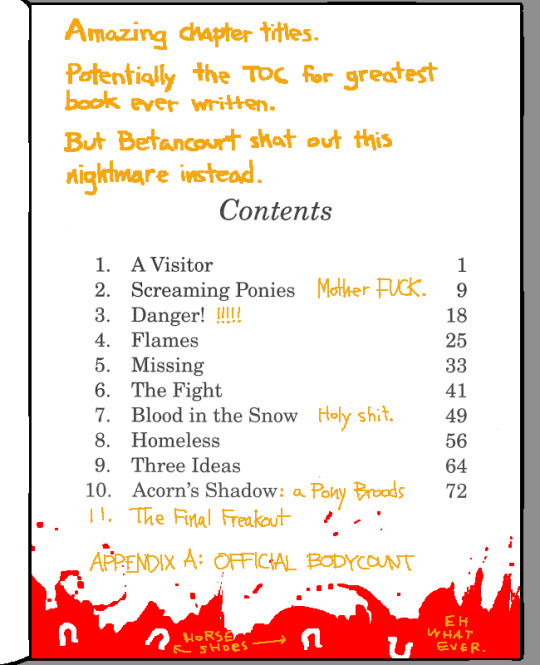
Except they’re not referring to that, they’re referring to the Homestuck Canon version of Detective Pony- a birthday gift from Dirk to Jane, heavily edited and to be much more obscene and eventually developing into it’s own story, stated to be “tough, emotionally draining, but cathartic in all the worst ways possible”.
Except the quote “Remember Longcat, Jane?” and references to philosophy, dead languages, and ancient earth culture aren’t referring to the three pages of the Dirk-edited Detective Pony we see in the actual comic itself. That quote doesn’t appear there.

That image is from Detective Pony, by Sonnetstuck- the 40,000 word fanfiction from 2014 that serves as a completed version of Jane’s copy of the book. An expansion of what we see in canon. And it’s a tough, emotionally draining read, but cathartic in all the worst ways possible.
It’s a very good fanfiction.
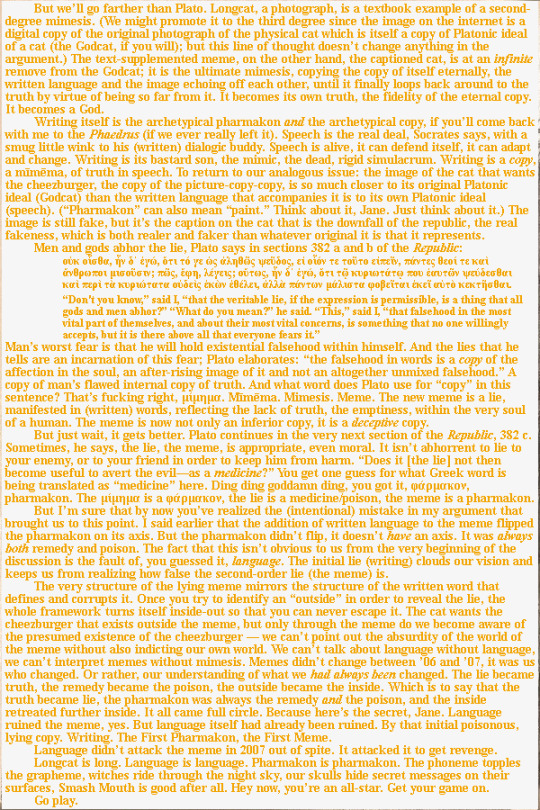
In the later bits of Detective Pony, we can start to see the origins of what would become Ultimate Dirk’s signature style of writing. Long blocks of rambling text, orange dripping down the page, references to philosophy and history and language that go on and on. And it probably does look familiar to those who read the Epilogues and ^2.
But there are a couple of key differences here. First of all, it’s just better written? The way these rambles circle back on themselves is so excellent, the absolute absurdity of this being written on top of a pony book for little girls, the humour (beyond some of the more immature stuff), it’s just a really well-written piece of fiction. Hell, you don’t even need to be familiar with the character of Dirk to enjoy it. It’s a harrowing piece, but it’s also self-aware- because it’s not supposed to be tough, draining, cathartic etc. just for Jane- it’s clearly that for Dirk himself.
The second part is, of course, that this is a fanfiction. It’s not canon, it’s not official, this is by someone who really likes Dirk for people who really like Dirk. It doesn’t matter in the grand scheme of things, so if you bounce off it (and I’m sure a lot did), then you don’t have to keep reading it, it’s fine, thanks for playing. As much as Homestuck^2 tried to doll itself up as “dubiously canon” it’s still the official continuation of the story, and that means if it’s as difficult to get into as Detective Pony, that’s going to be a problem for a lot of people.
The other part of it is that Detective Pony’s exploration of Dirk’s character is, well, in character. When the man himself steps in as a character in his own book, the explorations of what he is as an author, who he is as a person, make perfect sense for what we see of him at the start of the comic. He is that manipulative, blunt person, and he is aware of his faults. He’s the kind of person to hide a lamentation on his own failings inside an impenetrable maze of a story layered on top of a book about fucking ponies. Ultimate Dirk does not act like Dirk, outside of the “manipulator” angle, something that Dirk was aware of and trying to improve in the comic. But I guess people don’t have arcs, right?
It’s so interesting to see the seeds of Homestuck^2 laden within Detective Pony- because the meta angle that and the epilogues take is also represented in said fanfiction. While the nature of canon is a facet of the work, the idea of authors and narrators fighting for control of a story, different ideas in mind for the characters, one being more personally connected to them than the other, it’s all there. When I wrote about Fallout 4 in the past, I mentioned being worried that Bethesda took the wrong lessons from Skyrim- seeing something successful and trying to recapture that lightning in a bottle. I think Homestuck^2 is an extreme example of this- the writers of the comic saw Sonnetstuck’s masterwork and thought, yeah that’s great, we can do that. But they just can’t. And with the comic crashed and burning, the probably won’t ever get a chance to. Dirk is forever stuck as this amalgamation of himself that looks nothing like any individual version of him ever did.
At least we will still have Detective Pony, and many other excellent fanworks, for actually good Dirk content. I admittedly haven’t looked into much fanfic written during/post-epilogues, and I’m kind of afraid of what I’ll see- I can only hope the fanbase didn’t take the same wrong lessons as the official team did.
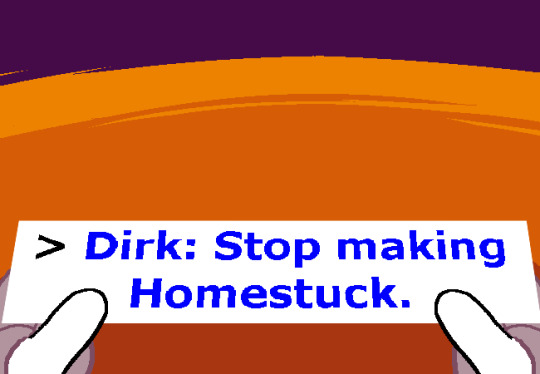
#ramble#honestly more of an essay#homestuck#homestuck 2#dirk strider#ultimate dirk#just ignore me accidentally posting this to the wrong account and having to reup it
32 notes
·
View notes
Photo

Ahmir “Questlove” Thompson
The Revolution Will Finally Be Televised
By Jay S. Jacobs
“The revolution will not be televised.”
When recording artist and poet Gil Scott-Heron first wrote that line in 1970, he probably wasn’t thinking of the Harlem Cultural Festival, which had been run the summer before. Or perhaps he was, as he was living in New York at about the time of the shows. Either way, it fit into the basic thesis of his song of the same name – certain parts of black culture were considered dangerous and did not fit in with the staid values of popular consumer society.
Ahmir “Questlove” Thompson, leader of the musical group The Roots and a DJ, certainly connected the Harlem Cultural Festival to the line. In fact, he paraphrased it as part of the title of his first film, a documentary about the festival and the black experience in the summer of 1969, which he calls Summer of Soul (… Or When the Revolution Could Not Be Televised).
The Harlem Cultural Festival was a free series of weekly concerts, highlighting some of the biggest names in soul, gospel, jazz and the blues. These included Stevie Wonder, Nina Simone, BB King, Sly and the Family Stone, Chuck Jackson, Abbey Lincoln & Max Roach, The 5th Dimension, Gladys Knight & the Pips, Mahalia Jackson, The Staple Singers, The Edwin Hawkins Singers and many others.
The festival was the brainchild of a local singer and promoter named Tony Lawrence. In hindsight it was unofficially considered the “Black Woodstock,” as that legendary counterculture music and arts festival happened at about the time of the second-to-last show of the Harlem Festival. Film producer Hal Tulchin filmed the entirety of the festival, certain that such a historic grouping of acts would make for a fantastic movie. After years of trying unsuccessfully to sell the project, all of the footage was stashed away in a basement, where it has sat unwatched ever since.
That is until it crossed onto the radar of Questlove, who has finally put together the film that Tulchin had dreamed of. Summer of Soul uses a good amount of the festival footage that the world has long been starved for and places the festival into a greater historical and social context of being African American in 1969.
A week before Summer of Soul was due to be released to theaters and Hulu, we were one of the lucky media outlets who had the opportunity to take part in a virtual press conference with Questlove to discuss the film.
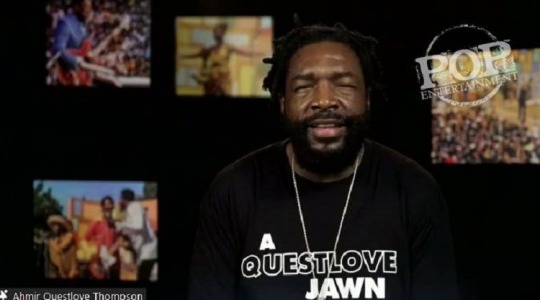
How did you learn about the unaired footage of the festival?
I first inadvertently saw the footage back when the Roots first went to Tokyo in 1997. My translator for that tour, who knew I was a soul fan, took me to a place called the Soul Train Cafe. Unbeknownst to me, I was watching two minutes of Sly and the Family Stone’s performance. Because it was what I know to be camera two – which was like the bird's eye view, nosebleed section – I didn't know I was watching the Harlem Cultural Festival. I just assumed that all festivals in the 60s were from Europe, because America really didn't have that culture yet. [I was] only to find out exactly 20 years later, when [producers] David Dinerstein and Robert Fyvolent told me that they had this footage, and they wanted me to direct the film. So, first seeing it without knowing it in ‘97 and presented to me in 2017. Even then, I didn't believe it was real.
What part of the process in making this film did you feel the greatest shift within yourself as an artist and storyteller? Was it looking through the footage, interviewing talent, festival attendees, piecing it all together, [or] the dialogue you've had with those who've seen your film?
(laughs) Without being all touchy feely with it, this project more than anything has helped me develop as a human being. For all the journalists out there, you know that sometimes artists can be really neurotic, living inside our heads. It's weird that even though I wrote the Creative Quest book, there was one point where I caught myself going back through chapters five through eight, mainly dealing with how creativity is transferable. I will not hesitate to admit that of all the things that I've done creatively, this is the one that I was really, really nervous about. And by nervous, I mean scared. Partly because I'm a perfectionist.
What I will say is that this film has really brought out an awareness and a confidence in me that I never knew that I ever had. A lot of the times, everything that I do creatively is behind a shield. Behind the drum set. Behind my Dad. Behind Black Thought. Behind Jimmy. Behind turntables. With the exception of teaching at NYU, you guys have never experienced me one on one. I have the safety of Instagram or a book. There's always a barrier that gets you from getting in there. That's how I thought I liked it. I will say that the amount of confidence that I got as a human being, this was a game changer for me.
Not saying that I'm going to go through life without fear and do Will Smith’s canyon jump or something like that. But on a technical side of things – despite this long ass answer I'm giving you – I also learned the power of editing. Most Roots albums are these gargantuan everything but the kitchen sink [affairs]. That’s what I'm bringing to the table. My first draft was like three hours and 35 minutes. This is where I really learned that less is more and less is impactful. The three hour and 35-minute version of the film probably wouldn't have hit you in the gut more than a very succinct two hours. Sorry, for that long answer. (laughs)

Why did you choose to focus much of the film on gospel music and the faith that has been in the background, if not the foreground of some of the performers?
Okay, that's a weird way to look at it. As far as I'm concerned, there was a perfect balance of soul music, of free jazz, of salsa music. The one genre that I truly left out was comedy. It would have taken me a good 20 minutes for me to really make sense of how the humor of the day worked for that audience, why they were killing. However, for me, the gospel aspect of it, I see gospel and free jazz as one and the same thing. I'm a guy that's always doing litmus tests with people, as far as like testing music out on them. I'm always making playlists for people. I'm DJing for people. You think you're just dancing to music, but I'm really testing people. There's no time in which I'm presenting music in which I'm not conducting an experiment. You just think that I'm DJing. Or you just think that I happened to put the song on. I'm really looking for reactions to see what people respond to.
There's one thing I always noticed, when I play soul music, really intense old music for younger people, they tend to find James Brown yelling humorous. (gives a James Brown screech) That's funny to them, because we live in a meme GIF culture, so those three seconds of something out of context can seem funny to people. There is a lot of… I guess what we can call primal musical expression or primitive exotic expression or just layman's terms, people acting wild. I wanted people to know that was more of a therapeutic thing than anything. If it's a gospel singer that's catching the spirit. If it's Sonny Shorrock doing one of the most atonal, destructive, violent solos I've ever seen on a guitar – which is weird because they rejected Jimi Hendrix playing here. He's the only one that asked to play, and they said no. But somehow, Sonny Shorrock got on. I wanted people to know that this just isn't black people acting wild and crazy, that this was a therapeutic thing. For a lot of us gospel music was the channel because we didn't know about dysfunctional families and therapy and life coaches that we have now.
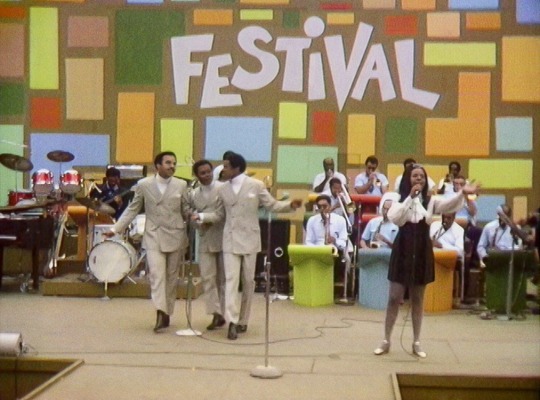
Did you have to fight to get the “A Questlove Jawn” credit approved?
Yeah, I had to register that with the DGA [Director’s Guild of America] and they approved it. Actually, that was my production partner, Joseph Patel. (laughs) It was this suggestion. I was really trying not to insert myself in the film. In the very beginning, when I was showing drafts to people, a lot of the complaints I got were like, “Well, wait, you're not in this. We need to hear your voice.” So I begrudgingly put my voice in the very beginning of the film, asking the first question. That candid moment that I had with Musa Jackson [a local Harlem resident who was at the festival as a boy] at the end? We yelled cut, but I didn't realize that they kept the tape rolling, so that was the actual real conversation that we were having. That was such a game changer, icebreaking moment. We realized that not only is this a movie, but we got to hand him his history back to him. We were just having a conversation, and the cameras happened to be running, so we kept it in there.
I was really careful not to insert myself in the story. I wanted this to stand on its own. I also know… or maybe I'm just in my head… I guess I imagined there was a jury of people just waiting on the sideline. At the very last minute, I let A Questlove Jawn go through and now I got to wear this every day. (Motions to his t-shirt.)

Which of the performers in the film would you most want to have played with?
Of course, the Captain Obvious answer is Stevie Wonder. But I will say that there's 40 hours’ worth of performance captured. You guys really only got to witness maybe 10 to 15% of it. As far as musicianship and intensity, BB King’s set was on fire. If I were vicariously one of those drummers during the set, I would have probably really enjoyed [it]. My art was closer with BB King’s set, as far as just the musicianship and whatnot. So yeah, I enjoyed his [act] a lot.
As a DJ, you're someone who tells stories via music. Were there are parallels between using those muscles, mixing music and the discipline in which you approach this wealth of footage, assembling it in a way so that it tells a story and has a narrative balance?
Me being a DJ is exactly what informed me on how to tell the story. I remember back in school, when we were learning about the story arc – establishing, rising action, climax, falling action, ending. I couldn't quite see it in the way that my teachers back in school wanted me to see storyline. So again, I actually had to refer to Creative Quest. It’s so weird, like I was out of my head for that one second. I couldn't blame it on also surviving in the pandemic. We really started the editing process at the top of the year which you’ve got to devote half the time to your survival and your family survival, and oh, also this movie. I will say that there was a point where I was wondering, could I take the same approach that I take to DJing, or putting a show together with this movie? That's exactly what I did.
For starters, for five months, I just kept it on 24-hour loop; no matter where I was, in the house or in the world. If anything gave me goosebumps, then I took a note of it. I felt like if there were at least 30 things that gave me goosebumps, we could have a foundation. I tend to work backwards. Whenever I'm given a project, the first thing I think about is what is the last 10 minutes of the show or the set that makes the person who goes home think like, “Man, that was incredible?” Usually the last 10 minutes of a show or presentation is your chance to [do a] Men in Black flashy thing [to] your audience. I've had disastrous Roots shows where I knew, okay, if I make these the last few songs and do these certain things, they'll forget about what happened in the middle of the show. That happens a lot. That's a trick I play.
I wanted to make my entry in the film world like my version of inserting myself in this film without me seeing it, in a TikTok way. Tell me you're the director of this film, without telling me you're a director. [The entry] was Stevie Wonder's drum solo. I figured that was the best way for me to crash land into your lives as a director without really it being about me. We have not seen Stevie Wonder in this light of a drummer. I thought that was the perfect beginning. That's pretty much how I crafted the show. I searched for my ending. I knew what I wanted my beginning [to be]. Then I worked backwards. I edited and paced this film backwards, as opposed to the other way.
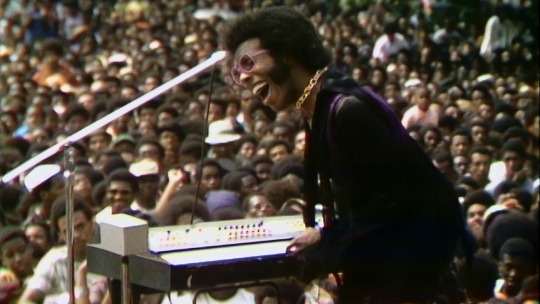
In the film Sly and the Family Stone is described as “transformative cool.” Later there's talk about the power of freedom music in 1969. Which artists or music genres do you see continuing that tradition of transformative cool and freedom music?
It's weird, when Greg Taylor said that Sly was transformative cool, he actually dropped a mighty seed in my head. Subsequently, while doing this film, I'm also working on my next book. I feel like such a product guys, but that's how I work. It's almost like I'm using the Prince manual. He already had Around the World in a Day ready right when Purple Rain was out. So right now my mind is on October to March of next year. I'm promoting what I did last year. But when he said transformative cool, and I really wanted to start to investigate. Oftentimes you think counterculture, you think hippies or white people whatnot. I wanted to investigate the black side of things.
I saw an article by April Walker and she's describing a black woman that comes on the train. She's trying to describe what cool is. This very beautiful black woman gets on the train. She noticed that four key people positioned on the trains were ogling her. From April's point of view, the more that this woman ignored the gaze, the more she became cool, because cool is more about what you leave out instead of what you bring in.
And Sly – preface, I'm now working on a Sly film – I'm just realizing that Sly’s role in the counterculture process in the Bay Area really starts in 1962. All those hippies that will come of age as teenagers, and young people, when they're 13, 14, 15, they're listening to Sly as a disc jockey. His radio show was really different back then. Like, he was really unhinged, talking about the man and going against the system. Stuff you weren't supposed to talk about in 1963-64. His version of cool was more about not being of the system. Being cool is what you leave out, not what you bring in. That's what I'm trying to process and learn right now. I hope I answered that question.
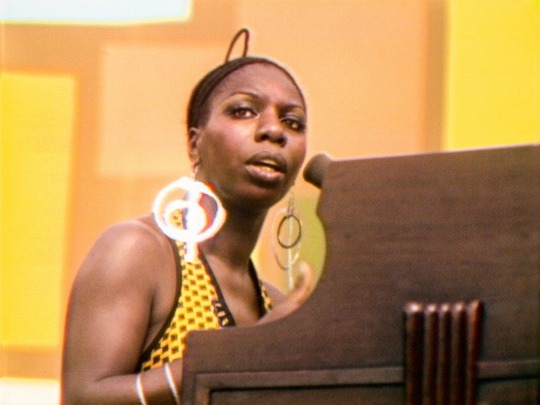
How much work did it take to make the audio work as well as it did in the final cut of the film?
There are two million-dollar questions of this film that are still unanswered. One, as hard as I tried, I could not get any direct connection to Tony Lawrence [who ran and hosted the festival]. I don't know if he's alive or dead. I don't know where he lives. Nothing of his legacy. The only paper trail I have of him are just other people that we found. The other thing was, how could that audio be so pristine? This is not to discredit our wonderful sound team, especially Jimmy Douglas, who is to me the God of engineers. He's the only engineer I've ever used on my albums which I never had to micromanage. I just send him the stuff. He knows what to do. He sends it back to me. And I have no complaints.
But I'll be honest with you, we had to do maybe 2% adjustment on the audio. The audio that you hear with the music is the dry rough mix, the soundboard, the reference mix. It sounded perfect. For the life of me, I can't figure out how 12 microphones were utilized in a way so powerful, especially the Stevie Wonder set, three of those microphones are on his drum set that he only uses once. The other three on his other drummers, so six microphones for two sets of drums. Then the other six – Stevie's vocal, one mic for the amp, the guitar and the bass combined. The rest are on the orchestra. I'm trying to figure out for the life of me, why is this sound so crisp and pristine? It's to the point where I'm almost tempted to strip down the Roots ourselves. I called my production manager telling him like, “Yo, they only used 12 to 15 microphones this whole production, and it sounds perfect. How many do we use?” And with a straight face, he was like, “All eleven of you? You guys use 103 mics.” (laughs) So 103 outlets. Yeah, I'm trying to figure out if The Roots as a band can even survive with just 15 microphones.

You've talked a lot about erasure of black history and the way this footage was just disregarded. Back in 1969. Woodstock got all the press, and the moon landing was huge. What are the keys to pushing back on similar erasure today and beyond?
Well, this. This is a step forward. This is the first time that I'm really seeing conversations that were never had before, especially post-pandemic. We weren't talking about mental health for black people, and we really weren't speaking of black erasure. Of course, previously, years before we sort of coded it as cultural appropriation, which was a really politically correct way of saying that. In the 80s, we would just say like, “Yo, man, why you always bitin’ my shit” or whatever. It was always draped in slang so that you couldn't see the heart or the sincerity of what the problem was – be it TikTok content or be it a festival.
I know this one thing. This isn't the only story out there. Probably the most shocking thing that I've learned in the last month, like in the last three to four weeks, I've gotten DMs from professors at universities letting me know, that bla bla bla bla bla, shot concert footage for 20 hours for something that they did over in New York. Then there's the da da da festival and all this. So this isn't the only footage that's just laying around unscathed. There's about six to seven others.
So, maybe this film can be an entry, a sea change for these stories to finally get out. Really, for us to acknowledge that, yes, even something as miniscule as content on social media, or as giant as one of the first ever black festivals, [it] is important to our history. The conversation is being had now. Normally the process is that we talk about it for three months, and then we forget about it. That'll remain to be seen. I know as for me, I didn't come into this wanting to be a director or any of those things. I do believe that, again, creativity is transferable. This is not my last rodeo with telling our stories. If anything, I'm more obsessed now than ever to make sure that history is correct, so that we don't forget who this artist is, or [what] that event is.
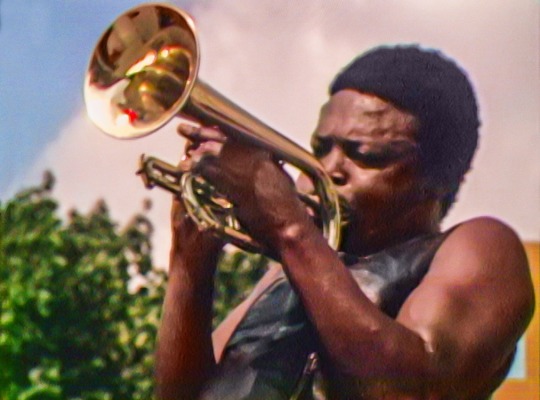
Do you think something like the Harlem Cultural Festival could be or would be put together today?
Yeah. I mean right now festivals are all the rage. Not to toot my own horn… I can say that The Roots Picnic [an annual festival in Philadelphia] is in the vein of the Harlem Cultural Festival. The Broccoli Festival in DC, that's probably the belle of the ball right now. Their festival is very similar to that. We're starting to see regional local festivals on this level happen now. In the last five years, there's another festival that we do in Alabama, my mind's drawn a blank right now. But yes, I do believe that America is catching up with festival culture.
The prime reason why the Roots had to pull a Hendrix and move to Europe – the UK, we lived there from ‘93 to about ‘97 – was basically because over in Europe there were over 700 festivals to choose from. Living in a country in which being a band was a rare thing at the time – we were like one of seven groups with a record deal. Right now, I think with a major record deal, it's Migos and the Roots (laughs) as far as non-solo acts, or, I mean, even groups. I'm not even talking about a band, but just people collaborating, that's a rare thing. So we had to move to Europe for four years, because we knew that festival culture was a thing in Europe.
In moving back to the United States, the first thing we said was if we have to show the world what we learned, what is that thing? That's why we wanted to do the Roots Picnic, to let people in our town know this is how it is over there. Now festivals are a thing.
What format was the festival recorded on? Can you describe the storage environment where the film was actually stored? Were you ultimately surprised that the film had not decayed over that time?
It was really forward thinking. Normally in 1969, if you're going to document something, chances are you're going to use 16mm [film]. It was Hal Tulchin’s [the original director of the festival footage] idea to film this on video because it's for television. So the quality looks like that of soap opera, that sort of videotape, which was brand new at the time. Of course, in the 80s, the mini cam became the norm. Back then, it was two-inch reels, but man, these reels were so heavy. The reels could hold about an hour worth of footage. I'll say that one of those canisters had to been about 17 pounds. So even that scene at the very end, where we had to show all the tapes piled on to each other – that was that was a damn workout. (laughs) That was like lifting boxes back and forth and you had to be very careful.
The basement environment that Hal Tulchin kept his tapes, it was pretty safe. He had it in a dry room in his basement. I think at the time in 2018 there were only five machines in the United States that were still working. And I believe seven people who even had the expertise and the knowhow on how to treat the film. It was a five-month process. I'm watching the video transfer of this movie, because Hal probably spent a good nine years trying to sell this thing. I think he gave up around like ’77 [or] ’78. Maybe there was one go around at a possible 20th anniversary thing or whatever. So they had made copies of it on VHS somewhere in the early 80s.
During the time that we sent this out to be – you got to bake the film, sort of moisten it a little bit so it doesn't snap. They had to practically with every frame lightly brush so that none of the film would be distorted. All but one reel, everything was damn near perfect, which was a miracle. The Staple Singers reel… The Staples were the only act that performed twice. Their first performance coupled with the rain; the quality was a little weird. But for the greater good, we still had to include it.
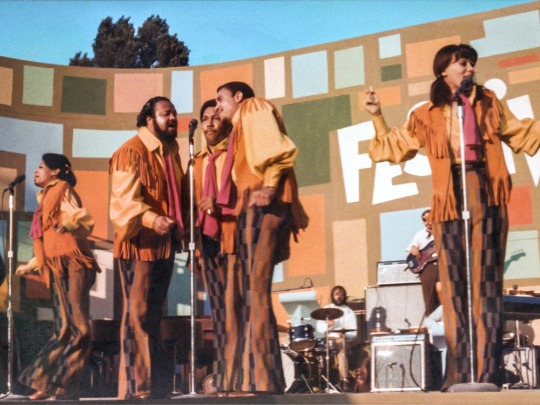
The interviews, the big reveals, especially the Fifth Dimension, can you talk about your reactions to their reactions and how that shaped the film emotionally going forward?
I'll say that the emotional component of the film was something that I wasn't preparing for. I really didn't know what's going to happen. It wasn't like the Barbara Walters moment where you know she's going to ask that question. It's like a carrot on the stick. I'm not going to cry, I'm not going to cry, that sort of thing. But only in conversation if they touch on something, I might have investigated. The emotional trigger moment, at least for the Billy Davis and Marilyn McCoo portion – I couldn't quite put my hand on it but my memory of all the Fifth Dimension performances I saw [previously] were composed and steady and very posh and sophisticated. This performance of theirs at the Harlem Cultural Festival was closer to that of a gospel revival. With the exception of one of their songs on their solo records – a song called “Like Your Love” – I've never heard Billy Davis Jr. use his raspy gospel baritone. That sort of James Brown-ish, “Sock it to me” thing. I thought that was humorous. I was like, wow, Billy, I never heard you use your gospel register before. They kind of opened the door and said, “It's because we were comfortable, and excited to be there. It wasn't the pressure of, we're on The Ed Sullivan Show. Or we're on the Jack Paar Tonight Show.”
I had a memento moment, as they're describing this. One, personally, I related to it. Because I realized… Oh, so black people have to code switch all the time. It's not just in the office space, but even in entertainment. I related to that. I'm a guy that has to adjust this show. If we're touring with Beck, we got to do a show a certain way. If we're doing Wu Tang Clan, certain way. If it’s System of a Down, certain way. Then next week is Erykah Badu. No one has more stress. I call my agent; okay, what part of town are we in? What's the audience look like? I have to code switch shows. All my shows aren't transferable to each audience. I have to adjust it for every place we go to. I noticed that. That was their way of telling me that they too, had to go through that pressure.
Probably the most telling moment of that festival that goes over people's heads was when I'm looking at David Ruffin’s performance. It's the middle of August, and he's wearing a wool tuxedo, and a coat. I'm like, why? It hit me that back then you had to be professional, even to the detriment of your own comfort. Meanwhile, the most revolutionary performance to that audience, nothing will beat watching camera four of the Sly and Family Stone performance. When all the kids are losing their minds. It would be like if I were to take my nieces and nephews or kids today [to] a Migos concert, and as a 50-year-old, I'm like, they're not Wu Tang clan, but they're alright. And watching kids go crazy. That's what adults were doing to Sly and Family Stone. They'd never seen a black act not wear a tuxedo. They were wearing their regular clothes, not to mention the intersectional and all that other stuff with the group that they never seen before.
Opening that door, also with Musa Jackson. He was five years old at the time. I was a little bit like, what five-year old’s going to give me insight of the emotional deepness of being there? The thing that won me over was he's like, “This is my first memory ever.” But he wasn't sure he had it, so we purposely didn't show him any footage. We took all the photos down. He saw none of this stuff for reference. He just came into a dry room. We just said tell us everything you know. He spoke and it was like, yo, he's saying he's saying it exactly like he remembers. So then once we showed him the footage, suddenly the tears started welling because for him as a 57-year-old, he didn't know if he remembered it. He didn't know if anyone believed him. Like if I didn't believe this happened as an adult, who's going to believe a 10-year-old like, “yeah, I saw Sly and the Family Stone and Nina Simone the other week in Harlem.” No one's going to believe that. My friends will lie about going to the Victory tour by the Jacksons like, “yeah, we saw Michael Jackson.” No, you didn't. You lied. So for him, it was like that little boy that cried wolf exoneration moment. I knew this happened! That's why I started crying. I didn't realize there was a heavy emotional component, really, until we allowed people to give commentary. I'm so glad we made that decision, instead of not doing that.
Copyright ©2021 PopEntertainment.com. All rights reserved. Posted: July 1, 2021.
Photos #1-2 ©2021 Jay S. Jacobs. All rights reserved.
Photos #3-10 ©1969/©2021. Courtesy of Searchlight Pictures. All rights reserved.
11 notes
·
View notes
Text
Rick Pender knows his Sondheim from A to Z
If the word “encyclopedia” conjures for you a 26-volume compendium of information ranging from history to science and beyond, you may find the notion of a Stephen Sondheim Encyclopedia perplexing. But if you have ever looked at a bookshelf full of book after book about (and occasionally by) the premiere musical theatre composer-lyricist of our era and wished all that information could be synthesized and indexed in one place, maybe the idea of a Sondheim encyclopedia will start to make a little more sense to you. It did to Rowman & Littlefield Publishers, an independent publisher that’s made encyclopedias such as this one of their calling cards, offering tomes on everyone from Marie Curie to Akira Kurasowa. Several years ago, they approached Rick Pender, longtime managing editor of the gone but never forgotten Sondheim Review and now, after years of research, writing, and pandemic-related delays, the The Stephen Sondheim Encyclopedia is finally hitting shelves. I sat down with Rick (via Zoom) to chat about this unique, massive project.
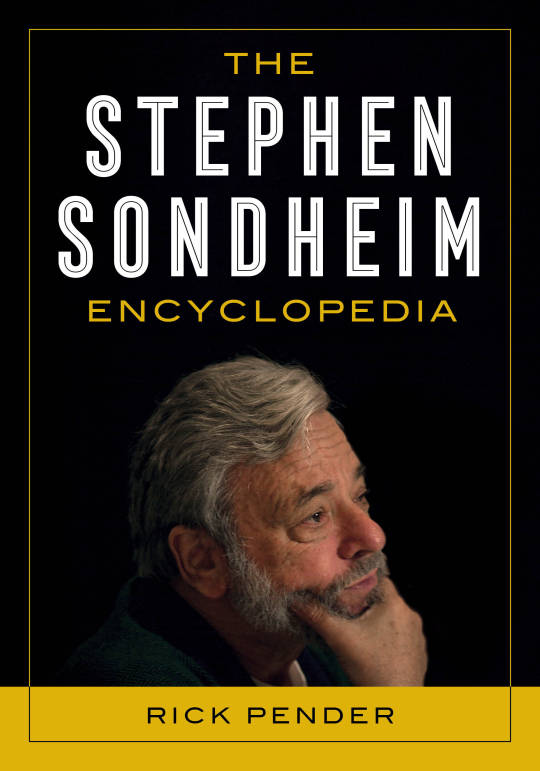
FYSS: I want to really focus on the new book, but we should start with your history with Sondheim and The Sondheim Review. How did you become so enmeshed in this work?
RP: As a teenager, the first LP that I bought was the soundtrack from West Side Story, and I didn't have any clue about who much of anybody was, particularly not Stephen Sondheim. But I loved the lyrics for the songs, especially “Something’s Coming” and “Gee, Officer Krupke.” These are just fabulous lyrics.
Then, of course, in the ‘70s it was hard as time went by not to have some awareness of Sondheim. I saw a wonderful production of Night Music in northeast Ohio, and I again just thought these lyrics are incredible, and I love the music from that particular show. Fast forward a little further in the late ‘80s, I was laid up with some surgery and I knew I was going to be bedridden for a week or two anyway, so I went to the public library and grabbed up a handful of CDs, and in that batch was A Collector's Sondheim, the three-disc set of stuff up through about 1985, and I must have listened to that a hundred times, I swear, because it had material on it that I didn't know anything about like Evening Primrose or Stavisky. So that really opened my eyes.
Later, my son had moved to Chicago. He's a scenic carpenter and a union stagehand. He worked at the Goodman Theatre, and I went to see a production when they were still performing in a theater space at the Art Institute of Chicago, and they had a gift shop there. And lo and behold in the rack I saw a copy of a magazine called The Sondheim Review! I thought, oh my gosh, I've got to subscribe to this! This would have been about 1996, probably, so I subscribed and enjoyed it immediately. A quarterly magazine about just about Stephen Sondheim struck me as kind of amazing.
In 1997-98 the Cincinnati Playhouse did a production of Sweeney Todd in which Pamela Myers, all grown up, played Mrs. Lovett, and so I wrote to the editor of the magazine and said, “Would you like me to review this?” That started me down a path for a couple of years of making fairly regular contributions to the magazine. Then in 2004 that editor retired, and I was asked to become the managing editor, which I did from 2004 to 2016. It went off the rails for some business reasons, but it lasted for 22 years which I think is pretty remarkable.
I tried to sustain it in an alternative form with a website called Everything Sondheim. We put stuff up online for about 18 months, and we published three print issues that look very much like The Sondheim Review, but we were not able to sustain it beyond that.
FYSS: How did the Encyclopedia project originate?
RP: The publisher asked me to write an encyclopedia about Stephen Sondheim! I envisioned that I would be sort of the general editor who coordinated a bunch of writers to put this together, but they said no, we're thinking of you as being the sole author. They had done a couple of other encyclopedias particularly of film directors, and those were all done by one person, so they sent me a contract asking me to generate 300,000 words for this book, and after I regained consciousness, I said all right, I'll give it a try.
It took me about two years – most of 2018 and ‘19 – to generate that content. I sent it off in the fall of ‘19, and then, well, the world stopped because of the pandemic. It was supposed to come out April a year ago, and they had just furloughed a bunch of their editors and everything stalled. But now it's coming out mid-April 2021.
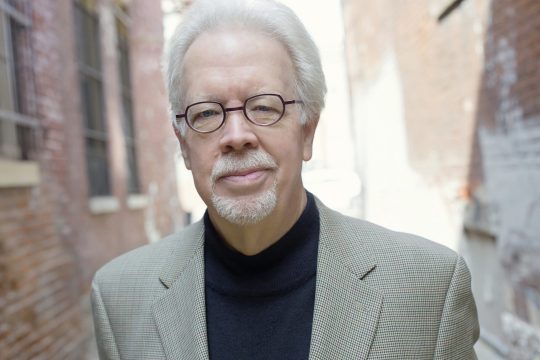
FYSS: What was the research and writing process like?
RP: This project came about in part because the publisher initially approached another writer, Mark Horowitz, who's at the Library of Congress and who had done a Sondheim book of Sondheim on Music. Mark and I had become quite close because he wrote a number of wonderful features about different Sondheim songs for The Sondheim Review. When I heard that that he had put my name out there, I went back to him after I had agreed to do this and said, Mark, could we use some of that material that you wrote for the magazine about those songs? And he said, sure do with them whatever you wish. And I was glad he said that, because they were really long pieces, and I've reduced each of them to about 1500-2000 words, which I thought was probably about the maximum length that people would really want to read in a reference volume.
But other than that, I generated everything else myself. I relied upon plenty of material within the 22 years of back issues of The Sondheim Review. Another great resource was Sondheim's own lyric studies, the two-volume set which provides so much information about the production of shows and that sort of thing.
Of the 131 entries I wrote for this, 18 of them are lengthy pieces about each of the original productions, so again Sondheim's books were certainly useful for that, and other books like Ted Chapin's book about Follies.
I also spent some time in Washington, D.C. at the Library of Congress, and Mark loaned me a quite a bit of material that he had collected – not archival material but scrapbooks of clippings that he put into ring binders of stuff about Sondheim's shows.
I came back to Cincinnati with about four or five cartons of materials, and I could really dig through that stuff as I was working on these. And then I have, as I'm sure you and lots of other Sondheim fans have, a bookcase with a shelf or two of Sondheim books, and those were all things that I relied upon, too.
I actually generated a list with lots and lots of topics, probably over 200, and I knew that was going to be more than I could do. Eventually, some things were consolidated, like an actor who perhaps performed in just one Sondheim show wasn't going to get a biographical entry, but I would talk about them in the particular show that they were involved in. So, I was able to collapse some of those kinds of things. But as I said, I did end up with 131 entries in the publication, and it turned out to be 636 pages, so that's a big fat reference book.
FYSS: Who is the intended audience for a work like this?
RP: The book is really intended to be a reference volume more than a coffee-table book. It does have photography in it, but it's black and white and more meant to be illustrative than to wallow in the glories of Sondheim. There is an extensive bibliography in it, and all the material is really thoroughly sourced so people can find ways to dig into more.
FYSS: Sometimes memories diverge or change over time. Did you come across any contradictions in your research, and how did you resolve them?
RP: I can't say that I can recall anything like that. I relied very heavily on Sondheim's recollections in Finishing the Hat and Look, I Made a Hat because he's got a memory like a steel trap. Once in a while I would email him with a question and get very quick response on things. I really used him as my touchstone for making sure of that kind of thing.
I also found that Secrest’s biography was very thoroughly researched, and I could rely on that. But I can't say that I found a lot of discrepancy, and some of those kinds of things were a little too much inside baseball for me to be including in the encyclopedia.
FYSS: For figures with long and broad histories, how did you decide what to include? George Abbott, for example, is the first entry in the book and he worked for nine decades! How important was writing about an individual as they relate to Sondheim vs. who they were more generally?
RP: To use George Abbott as an example, I would say that the first things that I
did was to go back to the lyric studies and to the Secrest biography and just look up references to Abbott. I mean, it was George Abbott who said that he wanted more hummable songs from Sondheim, so you know that was certainly an anecdote that was worth including because, of course you know, it becomes a little bit of the lyric in Merrily We Roll Along.
So you know, I would look for those kinds of things, but I also wanted to put Sondheim in context because Abbott was well into his career when he finally directed Forum which, since it was Sondheim's first show as a composer and a lyricist, is significant. That was very much the focus of that entry, but I wanted to lay a foundation in talking about Abbott, about all the things that he had done before that. I mean, he was sort of the Hal Prince of his era in in terms of his engagement in so many different kinds of things – writing plays, directing musicals, doctoring shows, all of that.
FYSS: Did any entries stick out to you as being the hardest to write?
I think the most complicated one to write about probably was Bounce/Road Show because it's got a complicated history, and Sondheim has so much to say about it. And because it's not a show that people know so much about, I wanted to treat it appropriately, but not as expansively as all of that background material might have suggested. So I kind of had to weave my way through that one. It also was a little tough to write about, because how do you write a synopsis of a show that has had several incarnations quite different from one another, and musical material that has changed from one to the other? With shows like that, I particularly tried to resort to the licensed versions of the shows.
FYSS: I haven't had a chance to read the book cover-to-cover yet, but I did read the Follies and the Into the Woods entries to try to get a sense of how you covered individual shows, and both of those are shows that had significant revisions at different times. And I thought you made it very clear what they were and also where to go for a reader who wants to learn more.
RP: Let me say one other thing this is not directly on this topic, but it sort of relates, and that is that in writing an encyclopedia, I didn't want to overlay a lot of my very individual opinions about things, but with each of the show entries I tried to review the critical comments that were made about the show in its original form, perhaps with significant revivals and that sort of thing, and then to source those remarks from critics at those various points in time. And of course, my own objectivity (or lack thereof) had something to do with what I was selecting, but I thought that was a good way to represent the range of opinion without having to make it all my own opinion.
FYSS: Did you feel any responsibility with regards to canonization when you made choices about what to include or exclude? What made the First National Tour of Into the Woods more significant than the Fiasco production, for example? Why do Side by Side by Sondheim & Sondheim on Sondheim get individual entries, but Putting It Together is relegated to the omnibus entry on revues?
RP: I guess that now you are lifting the curtain on some of my own subjectivity with that question. I tried to identify things that were particularly significant. I mean with the revues for instance, several of those shows – you know, particularly Side by Side by Sondheim, the very early ones – they were the ones I think that elevated him in people’s awareness. So, I think that to me was part of what drove that. And then shows that that were early touring productions struck me as being things that maybe needed a little bit more coverage. I think the Fiasco production was a really interesting one, but with the more recent productions of shows I just felt like there's no end to it if I begin to include a lot of that sort of thing.
FYSS: I mean it's so subjective. I'm not the kind of person who clutches my pearls and screams oh my goodness, how could you not talk about this or that. But I was surprised to see in your Follies entry that the Paper Mill Playhouse album was not listed among the recordings, for example. I imagine that once this book hits shelves you're going to be bombarded with people asking about their pet favorites.
RP: Oh, I'm sure, and maybe that will be a reason to do a second edition, which I’m totally ready to do.
The Sondheim Encyclopedia hits bookstore shelves April 15. It’s available wherever you buy books, but Rick has provided a special discount code for readers of Fuck Yeah Stephen Sondheim to receive 30% off when you order directly from the publisher. To order, visit www.rowman.com, call 800-462-6420, and use code RLFANDF30.
Celebrate the launch of The Sondheim Encyclopedia with a free, live online event featuring Rick Pender in conversation with Broadway Nation’s David Armstrong Friday, April 16 from 7:00 to 9:00 p.m. Eastern. More information and register here.
17 notes
·
View notes
Text
Tagged by @travellingwiththedead their post (here)
Rules: It’s time to love yourself. Choose your 5 favorite works you created in the past year (fics, art, edits, etc.) and link them below to reflect on the amazing things you’ve brought into the world. Tag as many writers/artists/etc. you want (fan or original) so we can spread the love and link each other to awesome works!
Thank you for the tag! I feel like I made a lot more fandom content over the year, but I think it was mostly memes 😂
Being Human Fandom stuff:
Hal Yorke: 500 years of fashion
12 individual watercolour illustrations, the 6 non-canon outfits are all based on paintings, illustrations, and garments from the time periods mentioned.
The Ikea Incident
Exploring Hal, Tom and Alex’s feelings about Ikea, because the original BH trio made their feeling clear. The first piece of fanfic I wrote in over 6 years, I’m extremely thankful for the lovely comments that encouraged me to write more!
December Drabbles
A sort of Advent Calendar of Christmas-themed Being Human fics, exploring all the different line ups and a few other characters. It’s probably not the highest quality of writing but I am extremely proud that I managed to keep it up for 15 days and at over 10,000 words it’s the most I’ve ever written!
Knitting and sewing stuff:
9 completed garments and accessories
A bit of a cheat to include this but I can’t choose between some of these and this isn’t even all of the knitting and sewing projects I completed in 2020 😅
The Egyptian Jumper + 1940s wool slacks
My most recently completed projects, this was a big technical challenge and handknit intarsia was a brand new technique I taught myself in 2020. The slacks also involved some pattern drafting which is something I want to explore more this year.
Tagging @nowwheresmynut @psmith73 @andwefaeries and @mobylace if you want to 😊
13 notes
·
View notes